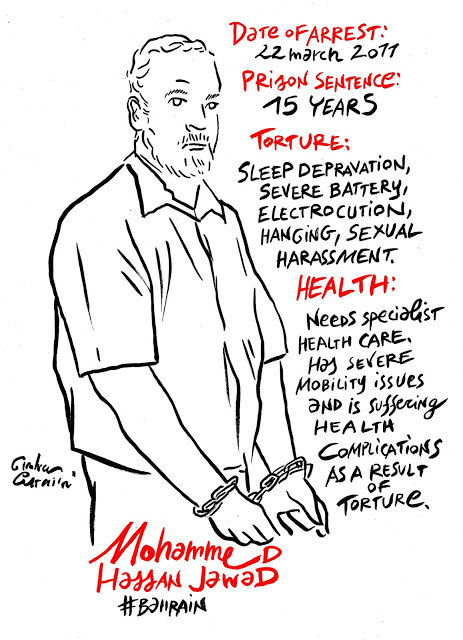In 2015, Chinese artist Ai Weiwei used Legos to create portraits of 176 political activists from around the world. Some of the names and faces of political exiles and prisoners of conscience were recognizable, such as Nelson Mandela, Aung San Suu Kyi, Edward Snowden, and Chelsea Manning. Included were some lesser known names around the world, like Mohamed Hasan Jawad of Bahrain.
While it may make some sense that Mandela and Snowden are recognizable by many, the global anonymity of Jawad is harder to understand. Arguably, Bahrain does not have the same international presence as apartheid South Africa, nor does it capture the world’s attention the same way as American intelligence intrusion does. However, the plight of Jawad and his fellow Bahraini political prisoners is doubly tragic. They are first, political prisoners in a country that violently suppressed mass demonstrations in which a majority of the population participated, and second, they are forgotten.
All eyes turned to the Middle East in the spring of 2011 as pro-democracy protests erupted across the region and in Bahrain. The Kingdom cancelled the 2011 Formula 1 road race amid the mass demonstrations. King Hamad promised reforms with the implementation of the Bahrain Independent Commission of Inquiry’s recommendations. However, in mid-March a combined force of Saudi and Emirati troops moved into the country and assisted the Bahraini security forces in violently suppressing the demonstrations. With this heavy-handed response, Bahrain seemed to disappear from the public eye as conflicts erupted in Syria and Yemen. However, protests remain ongoing and human rights abuses continue.
Bahrain held the most recent iteration of the Formula 1 from April 1-3, and though there were protests and two deaths, the race went on. Several weeks before the race, Bahraini forces arrested prominent human rights defender Zainab al-Khawaja and jailed her for tearing up a picture of the king. On April 6, the Bahrain Center for Human Rights noted the ongoing culture of impunity for security forces, as those guilty of abuses, torture, and even extrajudicial killings have had their jail sentences reduced. Yet, when President Obama goes to Riyadh to the GCC summit on April 21, the White House has made clear that his agenda will revolve around security concerns, particularly the fight against terrorism and Daésh. It remains to be seen whether President Obama will acknowledge the names and faces of those who fight for fundamental freedoms and democracy. Secretary of State John Kerry recently visited Bahrain and had a chance to bring up human rights but instead talked about Godiva chocolates. It appears that unfortunately neither Jawad nor his fellow prisoners of conscience, of whom there are many, will receive the attention they deserve any time soon.
Tyler Pry is an Advocay Intern at ADHRB
Photo courtesy of Channeldraw





